Cytomegalovirus (CMV)
Cytomegalovirus (CMV) antibody screen is run 3 times daily on Monday through Friday. The antibody screen is a qualitative detection of CMV IgG class antibodies in human sera by the FDA approved Zeus ELISA (enzyme-linked immunosorbent assay) test system.
Search CMVS code in the online Laboratory Test Catalog.
Epstein Barr Virus (EBV)
Epstein-Barr Virus virus detection is run 3 times daily on Monday through Friday and is the qualitative detection of Epstein-Barr virus (EBV) Viral Capsid Antigen (VCA) IgG, VCA IgM, and Nuclear Antigen (EBNA) IgG class antibodies in human sera by the FDA approved Zeus ELISA (enzyme-linked immunosorbent assay) test system. Results are reported as either Reactive, Equivocal or NON-reactive.
Search EBVEIA code in the online Laboratory Test Catalog.
Hepatitis A
shedding occurs in the weeks before clinical symptoms appear. Hepatitis A antibody testing is performed 2 times daily, Monday through Friday; IgM antibody tests are performed on all reactive specimens. Hepatitis A IgM indicates acute infection. All positive Hepatitis A IgM results are called to the requesting physician or laboratory and the local King County Dept. of Health. The physician must also report acute Hepatitis A infections to the local County Department of Public Health (in King County, telephone the Communicable Disease Department at (206) 296-4774). For vaccine recipients a Hepatitis A vaccine screen can be ordered. This assay does not include IgG/IgM differentiation if positive.
Search HAVIGG or HAVIGM code in the online Laboratory Test Catalog.
Hepatitis B
Hepatitis B is transmitted through blood or secretions of infected patients. Infectivity of a patient is determined by enzyme immunoassay for Hepatitis B surface antigen (HBsAg), which is run Monday through Friday. Reports of reactive HBsAg are called to the ordering physician or laboratory and are automatically run for Hepatitis B viral DNA by PCR. Patients with needle sticks and other parenteral exposures need to receive Hepatitis B Immune Globulin within 72 hours of exposure. The routine HBsAg run can accommodate most specimens generated by accidental parenteral exposure. The physician must also report acute Hepatitis B infections to the local County Department of Public Health (in King County, telephone the Communicable Disease Department at (206) 296-4774).
Note: Positive HBsAg will reflex to a Hepatitis B DNA by PCR at an additional charge.
Search HBSAG or HBSAGX code in the online Laboratory Test Catalog.
See Hepatitis B Chart 1, Chart 2, and Chart 3
Hepatitis B Surface Antibody & Hepatitis B Core Antibody
Hepatitis B surface antibody (anti-HBs) and Hepatitis B core antibody (anti-HBc) assays are useful for identifying persons susceptible to Hepatitis B infection (i.e. needle stick exposures), for documenting persons with past infection with Hepatitis B virus, for vaccine screening, and for determining response to vaccination. The Hepatitis B surface antibody result is reported international units (I.U.) of Hepatitis B surface antibody. Values above a test standard containing 10 I.U. of Hepatitis B surface antibody are considered protective levels. Vaccination/re-vaccination is warranted with values below this level. Anti-HBs assays and anti-HBc assays are performed daily Monday through Friday.
Search HBSS code in the online Laboratory Test Catalog for information on Hepatitis B Surface Antibody (HBsAb).
Search HBCA code in the online Laboratory Test Catalog for information on Hepatitis B Core Antibody (HBcAb).
Hepatitis B Core IgM Antibodies
Presence of Hepatitis B core IgM antibodies helps to distinguish chronic carriers of HBsAg from acute cases of Hepatitis B. Persons with recent exposure to Hepatitis B will be reactive for core IgM, while chronic carriers of HBsAg will not. This test is sent out to a Reference lab.
Search RHBCM code in the online Laboratory Test Catalog for information on Hepatitis B Core IgM Antibody.
Hepatitis A & B Battery
Hepatitis A & B Battery consists of the HBsAg, anti-HBs, anti-HBc and anti-Hep A tests. The laboratory requires 3-5 mL clotted blood or 1-2 mL of sera for the full battery.
Note: A positive HBsAg reflexes to a Hepatitis B by PCR, quant. at an additional charge.
Search HBB code in the online Laboratory Test Catalog for information on Hepatitis A & B Battery.
Hepatitis B ‘e’ Antigen and Antibody
The Qualitative detection of Hepatitis B virus “e” antigen (HBeAg) and Hepatitis B virus “e” antibody (HBeAb) in human sera by the FDA approved DiaSorin Diagnostic HBe enzyme immunoassay (EIA).
The presence of HBeAg in serum is associated with presence of Dane particles and Hepatitis B virus (HBV) DNA polymerase enzyme. These markers suggest active HBV replication. Hepatitis B Surface antigen (HBsAg) positive and HBeAg positive persons are much more likely to transmit infections to others. The development of anti-HBe during acute Hepatitis B infection is a marker of resolution of illness.
Search HBE code in the online Laboratory Test Catalog.
Hepatitis C Virus (HCV)
Hepatitis C is the leading cause of post transfusion hepatitis and of “non-A, non-B” hepatitis. It may be acquired by blood products or by non-parenteral routes. Most HCV infections are sub-clinical, and chronic hepatitis is common. All positive Hepatitis C antibodies are confirmed by PCR at an additional charge. Hepatitis C Antibody screens are run daily, Mon. – Sat.
Search HCAB or HCABX code in the online Laboratory Test Catalog.

